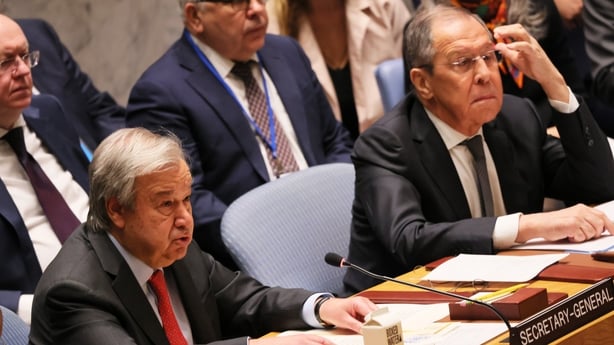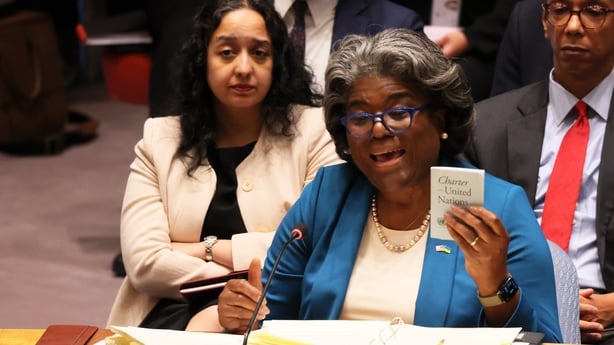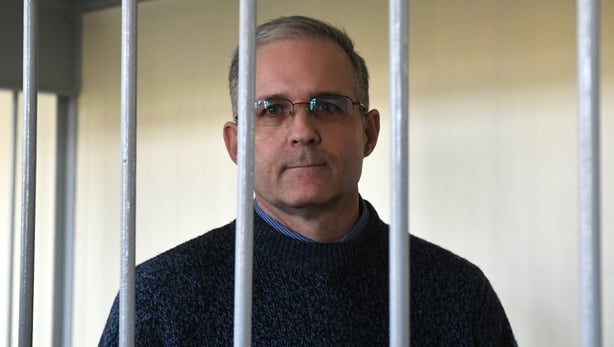Russia's Foreign Minister, Sergey Lavrov, arrived at the UN Security Council chamber with a large entourage and swept in without taking questions from journalists.
The meeting convened by Russia on the topic of "effective multilateralism and the defence of the UN Charter," kicked off with the Secretary-General of the United Nations, Antonio Guterres, lambasting Russia's attack on Ukraine.
"Russia's invasion of Ukraine, in violation of the United Nations Charter and international law, is causing massive suffering and devastation to the country and its people, and adding to the global economic dislocation triggered by the Covid-19 pandemic," he said.
Sitting to the Secretary-General’s left, Minister Lavrov then took the floor in his capacity of President of the UN Security Council and attempted to turn the tables by delivering a withering attack on the United States and its allies.

"Let’s call a spade a spade, no one allowed the Western minority to speak on behalf of all of humankind, there is a need to be polite and to respect all members of the international community," he told the council.
Mr Lavrov cited historical examples of American military aggression starting with the nuclear bombing of Hiroshima and Nagasaki at the end of the Second World War.
Laying out the "criminal misadventures of Washington," he went on to say "the shameful invasion of Iraq in 2003 was an egregious violation of the UN Charter, as was the aggression against Libya in 2011. The result was the destruction of statehood, hundreds of thousands of dead, rampant terrorism".
He blamed the US for a "brutal coup" in 2014 to install a "Nazi Kyiv regime," which Russia often cites as justification for the war.
"As during the Cold War, we have reached the dangerous, possibly even more dangerous, threshold," Mr Lavrov continued.
"The situation is worsened with the loss of trust in multilateralism."
He wrapped up his remarks with a rebuke to the US authorities for denying travel visas to Russian journalists to accompany him to New York.
"I insist that you compensate for the loss of Russian journalists," he said, addressing members of the UN press corps.
"Try to make your reporting objective," he added.
But when it was her turn to address the meeting, the US ambassador to the United Nations, Linda Thomas-Greenfield, raised the case of Wall Street Journal journalist, Evan Gershkovich, who was detained in Russia on charges of espionage. She called it a wrongful detention of a journalist who was "just doing his job".

Ambassador Thomas-Greenfield brought the sister of another detainee, the American Paul Whelan, who also holds Irish citizenship, to the Security Council meeting and accused Russia of using the men as "political bargaining chips, human pawns".
Elizabeth Whelan sat in the spectators’ gallery directly opposite Minister Lavrov.
"I want Minister Lavrov to look into her eyes and see her suffering," Ambassador Thomas-Greenfield said.
"I want you to see what it’s like to miss your brother for four years, to know he is locked up in a Russian penal colony simply because you want to use him for your own means," she added.

Russia holds the rotating presidency of the Security Council for the month of April, in line with UN procedure but over Ukraine's strong objections.
Whenever the security council is chaired by a foreign minister, other council countries will often send a senior minister too.
But this time, some delegations considered sending junior diplomats or no one at all, as a form of protest.
In the end, most members decided it was better to show up and speak up, rather than ceding the floor and possibly the upper hand to Mr Lavrov, a UN diplomat told RTÉ News.
Other council members including the UK, France, Switzerland and Japan added their criticism of Russia’s actions in Ukraine.
"A Russian generation has lost its future, and the Russian government can’t even explain why," the UK ambassador to the UN, Barbara Woodward, told the council.
"Russia’s justifications for the war - defeating Nazis and defending against bioweapons - are obvious falsehoods. Russia’s claims to Ukraine’s territory will never be recognised.
"For all of Mr Lavrov’s claims about effective multilateralism, I see nothing effective nor multilateral in Russia’s foreign policy," she said.
Lavrov to outline Russia's vision for 'new world order'
Mr Lavrov was also expected to outline Russia's vision for a multipolar world; one in which the United States has less power and Russia has more.
"Our idea is to hold a comprehensive, forward-looking strategic discussion about the contours of a new world order that is coming to replace the unipolar one," the Russian ambassador to the UN, Vasily Nebenzya said in a recent interview with Russian state media.
Meanwhile, China, a fellow permanent member of the security council, will want to appear to chart a middle course.
But China has continually abstained from UN resolutions condemning Russian's actions in Ukraine and the two regimes have moved closer together since Russia invaded Ukraine.
During his recent visit to Moscow, China's leader Xi Jinping told Russian President Vladimir Putin that the two men together were "driving changes - the likes of which we haven't seen for 100 years".
Changes to the world order are certainly at the heart of Kremlin strategy.
Earlier this month on a visit to Turkey, Mr Lavrov said that any peace agreement must "be about the principles on which the new world order will be based".
He added that Russia wanted to see an end to a unipolar world order led by "one hegemon", or supreme leader.
Tomorrow, a second meeting will be chaired by Mr Lavrov - this time on the Middle East.
Security Council diplomats will no doubt want to see how today goes, before deciding their strategy for tomorrow.







